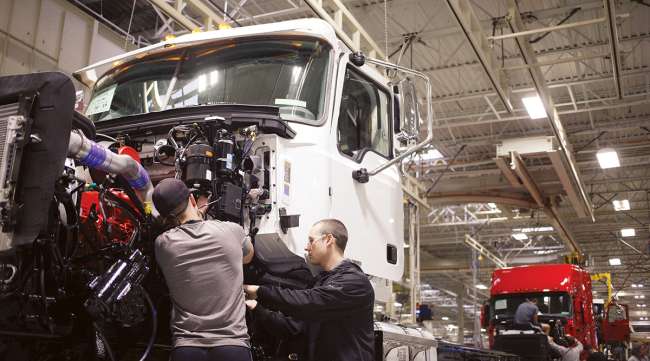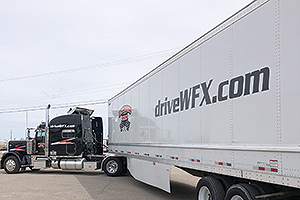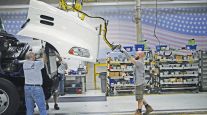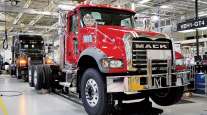Senior Reporter
Class 8 Orders Surge to Fourth-Highest Monthly Volume Ever

[Ensure you have all the info you need in these unprecedented times. Subscribe now.]
A mix of pandemic-driven freight demand linked with soaring freight rates, aging equipment and much fewer available production slots led fleets and dealers to place Class 8 orders of almost 52,000 in November, ACT Research reported, citing truck makers’ preliminary data.
Another analyst said the lower tiers of the supply chain remain stressed.
North American orders reached 51,900, according to ACT. That compares with 17,512 a year earlier and marks the fourth-highest volume in history.
The record for Class 8 orders was 53,040 in August 2018.
One fleet CEO said he is ordering new Class 8s again as the used truck market improves.
“As 2020 began, we had been through two full years of a depressed freight market,” Western Flyer Express CEO Randy Timms told Transport Topics. “The decline started in the last quarter of 2017, then ’18 and ’19 were severely depressed — that depressed period was then punctuated by the COVID-19 shutdown. As a result, we haven’t bought anything for at least a year. Our equipment is aging.”
To have sold his used trucks during that time would have meant taking a loss.
“So you basically have to keep them and wait for the market to cycle back around,” he said. “That presents a whole new set of challenges relative to higher maintenance costs and retention issues.”
That coming-back-around is happening. Freight demand and rates are rising. Used Class 8 trucks in October notched the first monthly year-over-year increase in average price after 17 such declines.

A Western Flyer Express truck. CEO Randy Timms said, "I estimate we will probably take 300 trucks in the next eight months." (Western Flyer Express)
“All of a sudden, the world is trying to get back to normal, and it just can’t get there fast enough,” Timms said. “Any time the world is in catch-up mode, that tends to be a good opportunity for trucking. So we are aggressively replacing equipment right now. I estimate we will probably take 300 trucks in the next eight months.”
He declined to identify the truck makers as negotiations were in progress.
Oklahoma City-based Western Flyer Express operates a fleet of 1,000 trucks and offers local, regional, dedicated and over-the-road lanes to company drivers and contractors.

Tam
ACT Vice President Steve Tam reacted to November’s volume by saying, “Holy cow. Right? That is way beyond what we were expecting, or what we think is necessary.”
ACT believes some dealers reacted to how fast the build slots were filling up in 2021 — already into the third quarter — and jumped in for themselves to restock or took a place in line to ensure customers had a future slot if needed, Tam said.
“We think for next year, replacement is about 270,000 for North America, which bumps up a little due to market dynamics, and would suggest an average of 22,500 orders a month,” he said.
ACT expects gross domestic product next year to be about 4% and freight growth to climb 8%. But if consumers pivot to spending on services as vaccines become plentiful, that could crimp the current goods-based growth in freight.
Meanwhile, Dan Olivier, interim chief financial officer at YRC Worldwide Inc., said on its third-quarter conference call, “We’re looking at about 300 new tractors in the fourth quarter and 950 or so new trailers.”
YRC Worldwide Inc. ranks No. 6 on the Transport Topics Top 100 list of the largest for-hire carriers in North America.
FTR pegged preliminary orders in November at 52,600.

Ake
Don Ake, FTR vice president of commercial vehicles, said the supply chain remains stressed amid the pandemic as lower-tier suppliers were facing challenges in hiring enough people to meet demand for what they supply.
“While the supply chain is better than it was [at the onset of the novel coronavirus], it is still not operating normally. You have a spike in business and a supply disruption, both caused by the pandemic. Things are still trying to reconnect, and that causes issues.”
Looking ahead, Paccar Inc. forecast a ramp-up in production next year of electric commercial vehicles as the market likely gets rolling with hundreds of orders.

Feight
“Then we’ll get to a point in 2024 and 2025 where there is some regulatory requirements for production, and by that time, we should see ourselves in the thousands — low thousands. It will obviously depend on what kind of regulatory environment develops throughout Europe or California,” Paccar CEO Preston Feight said during the company’s latest earnings call.
Paccar’s North American truck brands are Kenworth Truck Co. and Peterbilt Motors Co., and overseas the DAF brand.
“So we’ll be ready if there’s thousands or [the market] stays at hundreds, and if it wants to go to tens of thousands,” he said, “we’ll be prepared for that.”
Want more news? Listen to today's daily briefing:
Subscribe: Apple Podcasts | Spotify | Amazon Alexa | Google Assistant | More




